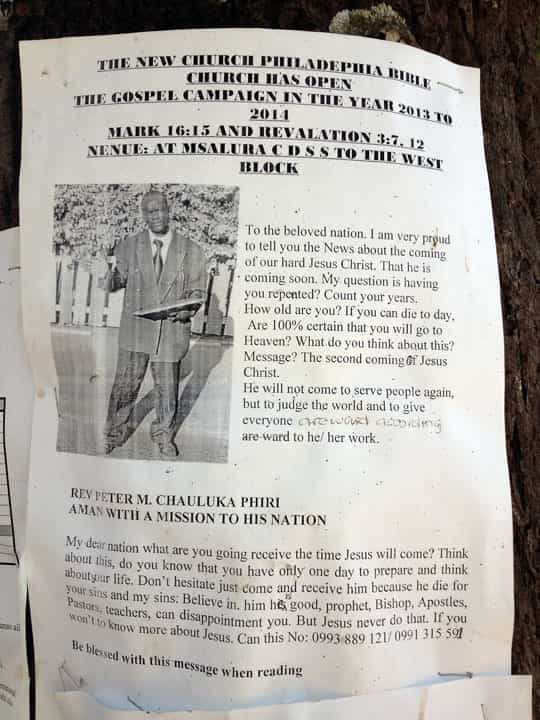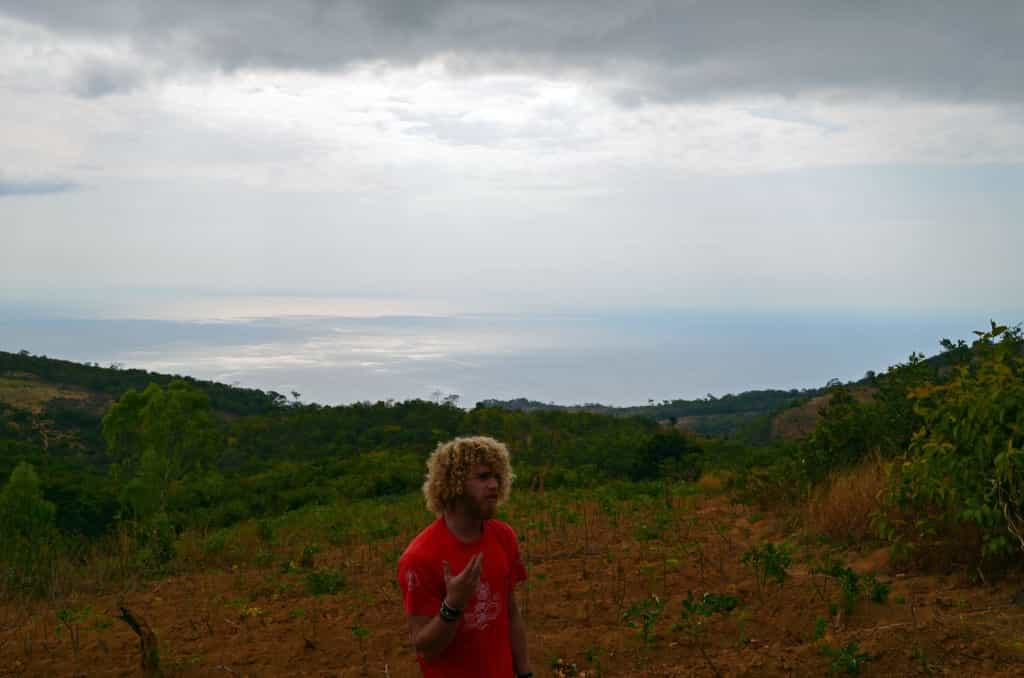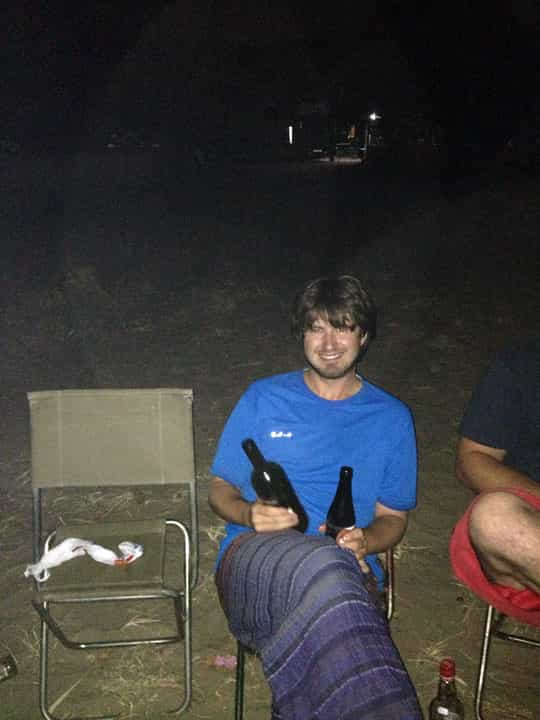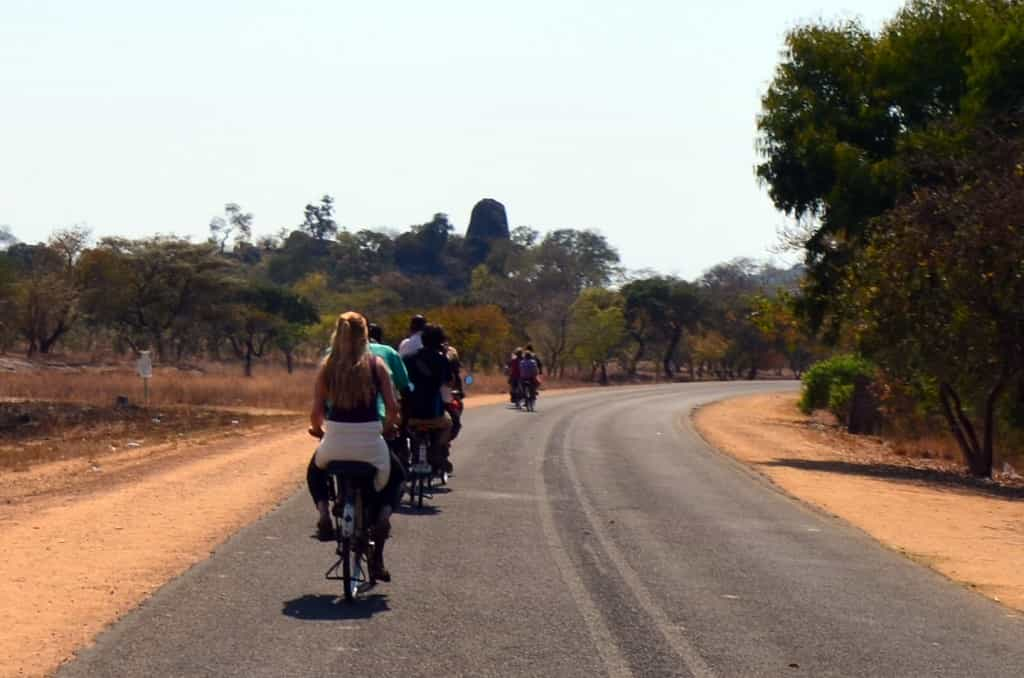Malawi was the 71st country I visited but, despite spending 4 days there, I would be a little embarrassed to say I went, as the horrible tour I was on did not allow me to see any of it. More on that later, but first, my favourite topic in Africa: religion.
OK, why not?
And since we are on the topic of phallic associations to deities, read the second sentence of this poster and find out if confusing lord and hard changes the meaning of it. Precious!
[Start of long rant about overland trips in general and G Adventure in particular – skip 8 paragraphs if you’re not in the mood to read my complaining]
Last year I rented a car in Cape Town and drove it 6,000 km through Namibia and Botswana, returning it in Johannesburg 6 weeks later. It was great and I would have been happy to do the same in East Africa, but this is nearly impossible. You could do it with your own car, but rental companies will not let you cross most of these borders, and a one-way rental is out of the question. Furthermore, Kampala, Nairobi and Dar Es Salam are some of the worst cities to drive around – or to drive through – in the world. So, I chose to do something I have never done before and book an organized overland group tour, going from Nairobi, Kenya to Livingstone, Zambia.
The very concept of how these tours are run, in East Africa anyway, is totally incomprehensible to me. The segments in the Serengeti, Zanzibar, Livingstone, and the stop at Lake Malawi, which I am about to talk about, were fine. The stops are rather short, but you do get a certain freedom to do as you please (not in the Serengeti, where you go on a game drive, but that’s fine, because it’s the only possible reason to go there). For the rest of the tours, you get up at dawn, spend the whole day driving on bad roads, occasionally stopping to eat a sandwich and piss against a tree, get to a little white-owned fenced-off campsite outside a city you don’t visit, eat in the dark, sleep in your tent and repeat the next day. The program lists the towns you drive through and sleep in the periphery of. Any reasonable person reading a list of towns with a bit of description of each one in an itinerary would assume these towns are visited, but that is not the case. The time available and the location of the campsites makes it unrealistic to grab local transportation to make your way in town.
Occasionally, we stopped briefly along the way to look at something and get a few explanations, such as at this viewpoint on the immense Lake Malawi. Our guide, Vernon, from South Africa, was extremely dedicated, helpful, professional and ran the horrible program as best he could. Our driver, Steve, was also top notch. Unfortunately, this couldn’t make up for the fact we were visiting Africa through a truck window.
Once we stopped along the road at a place I was actually interested in visiting. We often stopped at local handicraft and souvenir shops, which are fine, as locals get some revenue and many people like souvenirs. I just personally don’t care for them. In this case, it was a large market in Mzuzu, Malawi’s third largest city. Totally authentic, with things like axes, shovels and other tools hand made from a branch and a piece of heavily reworked scrap metal.
Incredibly, the tour managed to ruin this experience as well, something which actually required some effort. What apparently all the overland tour companies do when spending the night at Kande Beach is to have a costume party. Of course, a few locals picked up on it and assail you right off the bus to try to sell you strange clothes. I escaped immediately and went around to the large market. Eventually we found a nice lady making some fried breads, a bit like doughnuts but much more crusty, called mandazis. So here I am asking her what they are called, trying them, deciding to buy more because they are so good… and some loud guy walks up to me to sell me a bridal veil! This went on all around the market, on the way to, and at the truck.
I couldn’t help but wonder what the locals must think, here in one of the poorest countries of the world. Because of African pride, many make big sacrifices to buy clothes, but they know very well we are buying them for a joke; they are worthless to us. Guys shop around for silly looking shirts. Well, none of the traders sell silly shirts, they sell shirts. They are obviously second hand donated clothing and don’t look very trendy, but that is the best merchandise they could get their hands on. However, ridicule their wares as much as you want, and they will still make the sale with a smile. You can do that, because they are poor and you are not. The experience reminded me of Kuta Beach or Cancun and I was totally disgusted and embarrassed to be there. Crass, ignorant, insensitive tourism at it’s worst. I did not attend said party. At least the mandazis were good, as were the french fries we tried in the market (although they tasted a bit like chicken – I think the oil doesn’t get changed too often!)
As if the garbage program was not enough, G Adventure also uses garbage trucks. The clunking beast has a uselessly wide alley and narrow seats, no air conditioning so on dusty roads with the windows open, the inside becomes so full of dust you would never even dare pull out a laptop to have something to do on the 16.5 hour drive from Arusha to Dar Es Salam. Also, while all other tour companies use German built Man or Mercedes cabs, G Adventure uses crappy Tata, Indian-made models which are so underpowered, they can barely go 25 km/h if the road has an upward incline. All manners of public and private transportation passed us at all times, and all other companies arrived at the campsites way earlier than us. Many campsites offer upgrades, such as permanent safari tents, huts or rooms if you are getting tired of your tent, but with G Adventure, you can only hope for whatever remaining option none of the other groups wanted.
Notwithstanding all this self-imposed nonsense, any overland travel in Africa will involve surprises, such as when a car was parked in the middle of a one lane road, with the owner nowhere to be found! We ended up walking to the campground and the truck came when it could. This is the kind of mishap that actually becomes fun when you are flexible and take things with a smile. But you can travel on your own and encounter enough of these, no need to lock yourself up in an overland tour.
[End of the long rant!]
While we were not going to be able to visit the capital (which looked very developed compared to the rest of the country), or any of the major cities, we made the best of our time on Lake Malawi. We arranged for fishermen to take us to Kande Island on a rowboat, and we went on an organized village tour further south on the lake.
Before we left for the 800 m rowing trip, the fishermen were clearly stoned on marijuana, but we got there safely. I love being able to offer someone a drink and I found out all 8 of us shared that trait. So unsurprisingly, we discovered once on the island that we pretty much had each brought enough alcohol to get the other 7 drunk!
So we shared with the fishermen. We shared a lot! They looked quite drunk by the end. At least we didn’t feel bad that the original deal was to take us to the island for about 30 minutes, when we probably ended up spending a good 2 hours, until well after sunset.
We did keep enough booze for ourselves, as this picture indicates. It was taken by Katja a moment after she stepped on my sunglasses. Luckily, they were not on my face when she stepped on them.
On the way back, we asked the fishermen what they usually drank (we figured the relatively inexpensive Malawi gin and vodka we were drinking was probably still out of their price range). The told us they drank banana wine, so we asked them to get us some. It took a while but eventually, they returned with a couple of bottles (one an old wine bottle, the other some plastic juice jar). It cost next to nothing and we tried it. It did not seem very appealing, but thanks to a little open-mindedness and initiative, I now know what local guys drink in Malawi. The taste is hard to describe, but the word revolting comes to mind. Even Chris, who would usually drink anything was not really impressed, despite his smile.
The next day, we drove further south on the lake and other members of our group got a powerboat to take them to a slightly more distant island. I think they had fun, but they certainly were not as lucky with the weather!
The same guy who took them there offered a “village walk” the next morning. I thought it might be a little tacky, but with nothing else to do in the little fenced-off campground, I went. Turns out the village was nothing special, but another guide joined the first one, and he turned out to be very interesting to talk to. Chris and I questioned him about things like government services. Villagers don’t seem to pay income tax in Malawi, but they pay significant import tariffs on many things. As soon as we crossed into Zambia, I noticed that all the imported goods, from fancy stuff to a simple bag of Doritos, were significantly cheaper. Medical care is free, but hard to reach and limited in scope. Grade school is free, but not high school, and few people can afford to send their children. By and large, the government does not contribute a lot to the welfare of the average citizen.
Katja, in the role of Angelina Jolie. The kids were not begging or anything, so I wondered why they found us so interesting. Possibly arranged with the tour guides, since at some point they all left.
A tour to the local handicraft factory was of course on the itinerary, but as much as I am uninterested in what they sell, it was nice to see them work. I can’t say I recall the last time I had seen a hand-powered drill!
The village movie theatre. It only costs about 5 or 10 cents per movie. You may not get quality sound for that price, but you certainly get loud sound. That black thing in the door, the size of a refrigerator, is the speaker!
In the shops, repackaged products, like these cooking oil, baby formula and sugar pouches. This is common in very poor countries. Basic necessities are repackaged in smaller containers. A family might use $1 of cooking oil a week and the big $10 jar would last them a couple of months. But, for people living day to day where money means food, coming up with $10 all at once is difficult, so they buy small. The guy is not the shop owner, but our informative guide.
The pharmacy. Viagra and Celebrex were not to be found here.
The villagers use a type of bakery oven I had never seen. It is a residual heat oven. They burn wood in it, then completely remove the coals and ashes, leaving the bread to cook simply from the heat emanating from the thick oven walls.
Local fishermen picking small fish out of their nets. The one who looks out of place is our other guide (the not so informative one).
The village has a huge capacity to dry fish.
But it seemed rather underused on that day. Malawi had a huge overfishing problem in the 1980’s; I couldn’t help but wonder if they had really solved anything. Fishing is the main activity, but there is also a government-run technical school here. In fact, our guide expressed his desire to attend one day and become an engine mechanic. Since for a 2 hour tour, we paid him and his colleague the equivalent of 40% of the monthly salary of a schoolteacher, I found that a little hard to believe.
Finally, after a long walk south, we headed back to the campground on a bunch of bicycle taxis. Malawi has a history of severe fuel shortages, and motor vehicles are few and far between.
And finally, Malawi’s strange use, and non-use, of weird brick walls:
Why?
Why?
#Malawi























Enjoyable reading
Thanks Steinar, and thanks to you and Anna for helping provide the best part of this tour: good company. One day perhaps, I’ll be rich and I will buy you a coffee in Oslo 😉